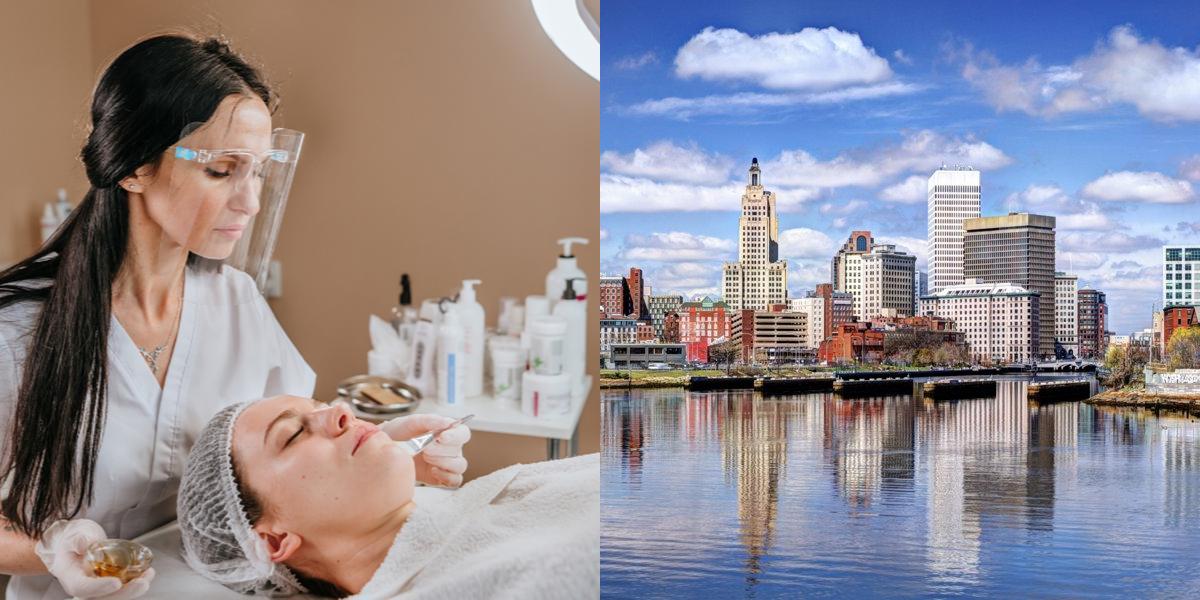How to Become an Esthetician in Rhode Island

What is an Esthetician?
An esthetician is a skincare specialist who helps clients improve and maintain the health and appearance of their skin. They perform various treatments and procedures such as facials, waxing, and chemical peels. Estheticians also educate clients about proper skincare routines and recommend products for their specific needs.
Responsibilities of an esthetician include:
- Analyzing clients' skin and determining appropriate treatments
- Performing facials, exfoliation, and extractions
- Applying makeup, including bridal and special occasion makeup
- Providing hair removal services like waxing and threading
- Offering advice on skincare products and routines
- Keeping up with industry trends and new skincare techniques
How do I get a job as an Esthetician?
After obtaining your esthetician certification, the next step is to find a job as an esthetician. Here are some steps you can take to increase your chances of finding employment as an esthetician:
-
Create a professional resume: Your resume is your first opportunity to make a good impression on potential employers. Be sure to highlight your esthetician training, any relevant work experience, and any additional certifications or skills you have acquired.
-
Network: Networking is a valuable tool for finding job opportunities in any field, including esthetics. Attend industry events, join professional organizations, and reach out to estheticians in your area to make connections and learn about job openings.
-
Apply for positions: Start applying for esthetician positions at salons, spas, and other establishments that hire estheticians. Many employers prefer to hire estheticians who have previous work experience, so be sure to highlight any relevant experience you have on your resume and in your cover letter.
-
Prepare for interviews: Once you start getting interview requests, take the time to prepare for each interview. Research the company you are interviewing with, practice common interview questions, and be prepared to discuss your skills and experience as an esthetician.
-
Be open to different opportunities: While you may have a specific type of esthetician job in mind, it is important to be open to different opportunities, especially when you are just starting out. Consider working in different settings, such as a salon, spa, or dermatology office, to gain experience and expand your skills.
-
Build your clientele: As you start your career as an esthetician, it is important to focus on building and maintaining a strong client base. Provide excellent service to each client, ask for referrals, and consider offering special promotions or discounts to attract new clients.
By following these steps and staying motivated and persistent in your job search, you can increase your chances of finding a job as an esthetician.
Career Paths and Opportunities after Becoming an Esthetician
Becoming an esthetician opens up a wide range of career paths and opportunities. Here are some potential career paths you can pursue after becoming an esthetician:
-
Salon or spa esthetician: Many estheticians choose to work in salons or spas, providing services such as facials, waxing, and makeup application. This is a popular career path for estheticians, as it provides a steady stream of clients and the opportunity to work in a team environment.
-
Medical esthetician: Medical estheticians work alongside dermatologists and other medical professionals to provide skincare treatments to patients. This may include performing chemical peels, microdermabrasion, and laser treatments. Medical estheticians often work in dermatology offices, plastic surgery clinics, or medical spas.
-
Makeup artist: Some estheticians choose to specialize in makeup artistry and work as freelance makeup artists or for cosmetic companies. This career path often involves working with clients for special events, such as weddings or photo shoots, and requires a strong knowledge of makeup products and techniques.
-
Educator or trainer: If you have a passion for teaching, you may consider a career as an esthetics educator or trainer. This involves teaching aspiring estheticians in esthetician training programs, conducting workshops and seminars, and staying up-to-date with the latest advancements in the field.
-
Product development: Another career path for estheticians is product development. This involves working for skincare or cosmetic companies to develop and test new products. Estheticians with a strong understanding of skincare ingredients and formulations are highly valued in this field.
-
Entrepreneurship: Many estheticians choose to start their own business and become entrepreneurs. This may involve opening your own salon or spa, offering mobile esthetician services, or creating your own skincare or cosmetic line. Starting your own business allows you to have more control over your schedule and services offered.
These are just a few examples of the career paths and opportunities available to estheticians. The beauty industry is constantly evolving, and there is always room for growth and advancement in this field.
Final Thoughts
Becoming an esthetician can be a fulfilling and rewarding career choice for those interested in skincare and beauty. By following the steps to obtain your esthetician certification, networking, and applying for esthetician positions, you can start your career as an esthetician.
There are also various career paths and opportunities available to estheticians, including working in salons or spas, becoming a medical esthetician, specializing in makeup artistry, or starting your own business. The beauty industry offers endless possibilities for growth and advancement.
If you are passionate about skincare and helping others feel confident and beautiful, pursuing a career as an esthetician may be the perfect fit for you. Start by researching the requirements for esthetician certification in your state and taking the necessary steps to obtain your license. From there, the sky is the limit in terms of the career opportunities available to you as an esthetician.
If you're thinking of a new career path, Dreambound offers in-depth guides to understand various job choices:

Pia Yapjoco is part of the school growth and sales team at Dreambound. She helps facilitate school partnerships that expand educational opportunities for aspiring students in allied health and other trades. Beyond work, she curates her pup's Instagram, hunts for hidden coffee gems, and escapes into cozy gaming.



